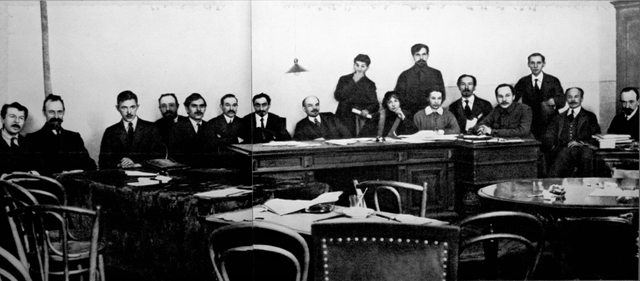Council of People's Commissars

Council of People's Commissars

The Council of People's Commissars (Russian: Совет народных комиссаров or Совнарком, translit. Soviet narodnykh kommissarov or Sovnarkom, also as generic SNK) was a government institution formed soon after the October Revolution during 1917. Created in the Russian Republic, the council began forming the Union of Soviet Socialist Republics (USSR). It evolved to become the greatest executive authority of the government of the USSR. The premier of this council was thus the head of government (whereas the Premier of the Presidium of the Supreme Soviet was head of state).
The 1918 Constitution of the RSFSR formalized the role of the Sovnarkom of the Russian Soviet Federative Socialist Republic (RSFSR): it was to be responsible to the Congress of Soviets for the "general administration of the affairs of the state". The constitution enabled the Sovnarkom to issue decrees having the force of law when the Congress was not in session. The Congress then routinely approved these decrees at its next session.
When the USSR was established during December 1922, the USSR Sovnarkom was modeled on the RSFSR Sovnarkom. It was transformed during 1946 into the Council of Ministers.[1]
Original People's Commissars
The first council elected by the Second All-Russian Congress of Soviets was composed as follows. Many early comissars later opposed the party majority organized by Stalin and allegedly conspired with the Trotskyist opposition[2] or some other opposition group, which resulted in their expulsion from the party or being arrested. The party had banned factional opposition groups at the Eleventh Party Congress during 1921.[3] Still the original People's Comissariat included Left-Communists, Trotskyists and other ex-oppositionists. Most alleged conspirators were executed for treason during the Great Purge, some had sentences reduced to imprisonment.[4]
| People's Commissar | Original incumbent | Death |
|---|---|---|
| Premier | Vladimir Lenin | Stroke, 1924 |
| Secretary | Nikolai Gorbunov | Executed 1938 |
| People's Commissariat for Agriculture of the RSFSR | Vladimir Milyutin | died in prison 1937 |
| Council of People's Commissars on War and Navy Affairs | Nikolai Krylenko (War College) | Executed 1938 |
| Pavel Dybenko (Navy College) | Executed 1938 | |
| People's Commissariat for Trade and Industry of the RSFSR | Viktor Nogin | Natural causes 1924 |
| People's Commissariat for Education of the RSFSR | Anatoly Lunacharsky | Natural causes 1933 |
| People's Commissariat for Food | Ivan Teodorovich | Executed 1937 |
| People's Commissariat for Foreign Affairs of the RSFSR | Leon Trotsky | Assassinated 1940 |
| People's Commissariat for Interior Affairs of the RSFSR | Alexei Rykov | Executed 1938 |
| People's Commissariat for Justice | Georgy Oppokov | Executed 1938 |
| People's Commissariat for Labour | Alexander Shlyapnikov | Executed 1937 |
| People's Commissariat of Marine Fleet of the USSR | Semyon Dukelsky (Russian:Дукельский, Семён Семёнович) | In connection with the increased paranoia is placed in the hospital. He wrote denunciations against doctors allegedly plotting to kill him on instructions from US intelligence.[5] Natural causes 1960 |
| People's Commissariat of Nationalities | Joseph Stalin | Natural causes 1953 |
| People's Commissariat for Posts and Telegraphs of the RSFSR | Nikolai Glebov-Avilov | Executed 1937 |
| People's Commissariat for Railways | (vacant) | |
| People's Commissariat for Finance | Ivan Skvortsov-Stepanov | Typhoid fever 1928 |
| People's Commissariat for Social Welfare | Alexandra Kollontai | Natural causes 1952 |
All-Union Sovnarkom
Upon the creation of the USSR in 1922, the Union's government was modelled after the first Sovnarkom. The Soviet republics retained their own governments which dealt with domestic matters.
Sovmin
Councils by administrative division
Soviet republics
Council of People's Commissars (Soviet Union)
Council of People's Commissars (Russia)
Council of People's Commissars (Ukraine) (Temporary government of Workers and Peasants of Ukraine)
Council of People's Commissars (Belarus), including LitBel
Council of People's Commissars (Azerbaijan)
Council of People's Commissars (Far East)
Council of People's Commissars (Armenia)
Council of People's Commissars (Bukhara)
Council of People's Commissars (Khorezm)
Council of People's Commissars (Georgia)
Council of People's Commissars (Abkhazia), including as autonomous
Council of People's Commissars (Turkestan)
Council of People's Commissars (Transcaucasia)
Council of People's Commissars (Kazakhstan), including as autonomous Kyrgyz (before 1925)
Council of People's Commissars (Turkmenistan)
Council of People's Commissars (Kyrgyzstan), including as autonomous Kyrgyz (after 1925)
Council of People's Commissars (Uzbekistan)
Council of People's Commissars (Tajikistan), including as autonomous
Council of People's Commissars (Karelia-Finland), including as autonomous Karelia
Council of People's Commissars (Moldova), including as autonomous
Council of People's Commissars (Lithuania)
Council of People's Commissars (Latvia)
Council of People's Commissars (Estonia)
Autonomous republics
Council of People's Commissars (Adjara)
Council of People's Commissars (Volga German)
Council of People's Commissars (Bashkorstan)
Council of People's Commissars (Buryat-Mongolia)
Council of People's Commissars (Mountainous)
Council of People's Commissars (Dagestan)
Council of People's Commissars (Kabardin-Balkaria), including Kabardin (1944-1957)
Council of People's Commissars (Cossack)
Council of People's Commissars (Kalmykia)
Council of People's Commissars (Karakalpakistan)
Council of People's Commissars (Komi)
Council of People's Commissars (Crimea)
Council of People's Commissars (Mari)
Council of People's Commissars (Mordva)
Council of People's Commissars (Nakhichevan)
Council of People's Commissars (North Osetia)
Council of People's Commissars (Tatarstan)
Council of People's Commissars (Tuva)
Council of People's Commissars (Udmurtia)
Council of People's Commissars (Chechnia-Ingushetia)
Council of People's Commissars (Chuvashia)
Council of People's Commissars (Yakutia)
Failed or quasi
Council of People's Commissars (Donetsk-Krivoi Rog)
Council of People's Commissars (Odessa), initially as Rumcherod
Council of People's Commissars (Poland)
Council of People's Commissars (Galicia)
Council of People's Secretaries (Soviet Ukraine)
See also
26 Baku Commissars
Government of the Soviet Union
Deputy Premier of the Soviet Union
First Deputy Premier of the Soviet Union
Executive Officer of the Soviet Union
Council of Ministers
Cabinet of Ministers